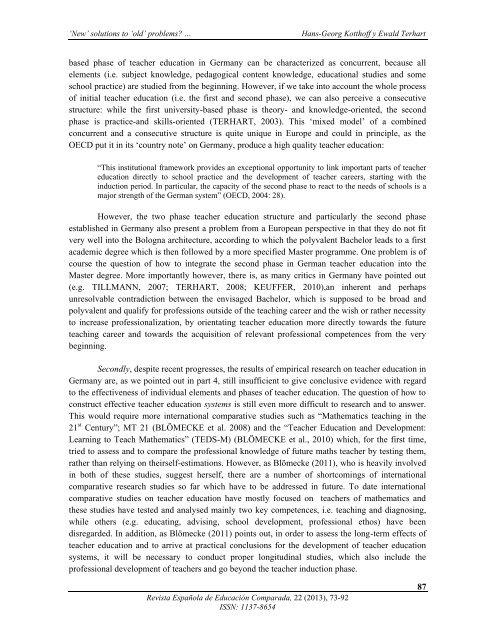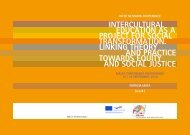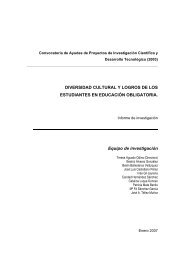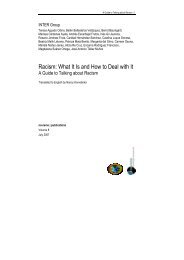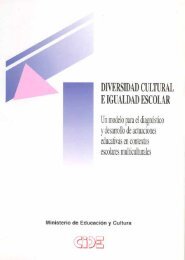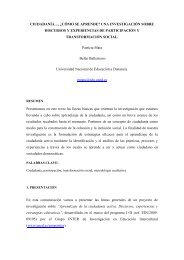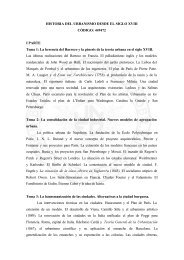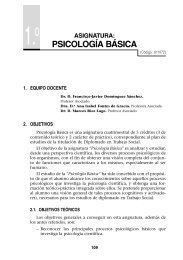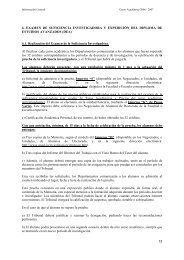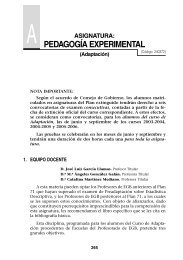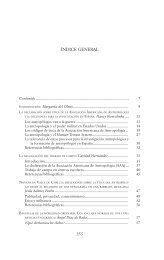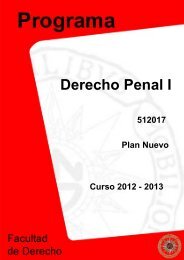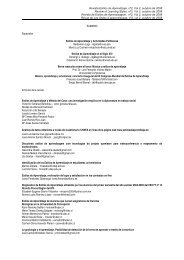'NEW' SOLUTIONS TO 'OLD' PROBLEMS? RECENT ... - UNED
'NEW' SOLUTIONS TO 'OLD' PROBLEMS? RECENT ... - UNED
'NEW' SOLUTIONS TO 'OLD' PROBLEMS? RECENT ... - UNED
You also want an ePaper? Increase the reach of your titles
YUMPU automatically turns print PDFs into web optimized ePapers that Google loves.
‘New’ solutions to ‘old’ problems? …<br />
Hans-Georg Kotthoff y Ewald Terhart<br />
based phase of teacher education in Germany can be characterized as concurrent, because all<br />
elements (i.e. subject knowledge, pedagogical content knowledge, educational studies and some<br />
school practice) are studied from the beginning. However, if we take into account the whole process<br />
of initial teacher education (i.e. the first and second phase), we can also perceive a consecutive<br />
structure: while the first university-based phase is theory- and knowledge-oriented, the second<br />
phase is practice-and skills-oriented (TERHART, 2003). This ‘mixed model’ of a combined<br />
concurrent and a consecutive structure is quite unique in Europe and could in principle, as the<br />
OECD put it in its ‘country note’ on Germany, produce a high quality teacher education:<br />
“This institutional framework provides an exceptional opportunity to link important parts of teacher<br />
education directly to school practice and the development of teacher careers, starting with the<br />
induction period. In particular, the capacity of the second phase to react to the needs of schools is a<br />
major strength of the German system” (OECD, 2004: 28).<br />
However, the two phase teacher education structure and particularly the second phase<br />
established in Germany also present a problem from a European perspective in that they do not fit<br />
very well into the Bologna architecture, according to which the polyvalent Bachelor leads to a first<br />
academic degree which is then followed by a more specified Master programme. One problem is of<br />
course the question of how to integrate the second phase in German teacher education into the<br />
Master degree. More importantly however, there is, as many critics in Germany have pointed out<br />
(e.g. TILLMANN, 2007; TERHART, 2008; KEUFFER, 2010),an inherent and perhaps<br />
unresolvable contradiction between the envisaged Bachelor, which is supposed to be broad and<br />
polyvalent and qualify for professions outside of the teaching career and the wish or rather necessity<br />
to increase professionalization, by orientating teacher education more directly towards the future<br />
teaching career and towards the acquisition of relevant professional competences from the very<br />
beginning.<br />
Secondly, despite recent progresses, the results of empirical research on teacher education in<br />
Germany are, as we pointed out in part 4, still insufficient to give conclusive evidence with regard<br />
to the effectiveness of individual elements and phases of teacher education. The question of how to<br />
construct effective teacher education systems is still even more difficult to research and to answer.<br />
This would require more international comparative studies such as “Mathematics teaching in the<br />
21 st Century”; MT 21 (BLÖMECKE et al. 2008) and the “Teacher Education and Development:<br />
Learning to Teach Mathematics” (TEDS-M) (BLÖMECKE et al., 2010) which, for the first time,<br />
tried to assess and to compare the professional knowledge of future maths teacher by testing them,<br />
rather than relying on theirself-estimations. However, as Blömecke (2011), who is heavily involved<br />
in both of these studies, suggest herself, there are a number of shortcomings of international<br />
comparative research studies so far which have to be addressed in future. To date international<br />
comparative studies on teacher education have mostly focused on teachers of mathematics and<br />
these studies have tested and analysed mainly two key competences, i.e. teaching and diagnosing,<br />
while others (e.g. educating, advising, school development, professional ethos) have been<br />
disregarded. In addition, as Blömecke (2011) points out, in order to assess the long-term effects of<br />
teacher education and to arrive at practical conclusions for the development of teacher education<br />
systems, it will be necessary to conduct proper longitudinal studies, which also include the<br />
professional development of teachers and go beyond the teacher induction phase.<br />
Revista Española de Educación Comparada, 22 (2013), 73-92<br />
ISSN: 1137-8654<br />
87


